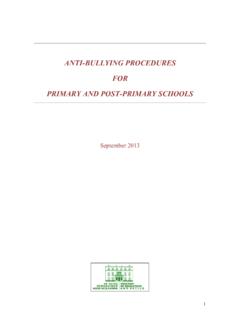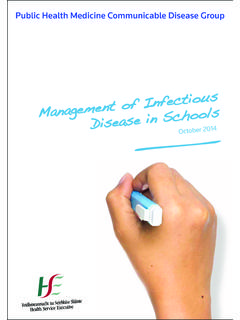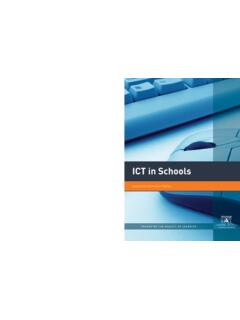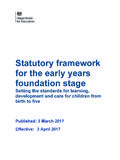Transcription of A Continuum of Support for Post-Primary Schools
1 A Continuum of Support for Post-Primary Schools Resource pack for Teachers 1. Introduction to Resource pack This resource pack should be used in conjunction with the document, A. Continuum of Support for Post-Primary Schools . It is a publication by the National Educational Psychological Service which aims to Support Post-Primary Schools in their work with young people. Briefly, the Continuum refers to three levels of Support in Schools ; Support for ALL, school Support and school Support Plus. Support for ALL is a process of prevention, effective mainstream teaching and early identification. These systems are available to all students and effectively meet the needs of most students.
2 school Support (for Some) is an assessment and intervention process which is directed to some students, or groups of students who require some additional input. school Support Plus (for a Few) is generally characterised by more intensive and individualised supports. This level of intervention is for students with complex and/or enduring needs and relatively few students will need this level of Support . The pack is organised into five, colour-coded sections, as follows: Creating Positive Learning Environments Gathering Information In- school Screening and Assessment Planning, Monitoring and Review Effective Interventions Schools are encouraged to use and adapt the resources to fit their specific context.
3 NEPS is committed to the on-going development of services in Schools and welcomes feedback about these resources. The resource pack is available on-line at 2. Resource pack Creating Positive Learning Environments Understanding Adolescence 4. Completion of Learning Environment Checklist (LEC) - Notes 6. The Learning Environment Checklist (LEC) Post-Primary 8. Completion of the LEC Summary Chart 13. LEC Summary Chart 14. Learning Environment Intervention Plan 19. Positive classroom rules- examples 21. Guideposts to providing a positive climate 22. Gathering Information Post-Primary Transfer Review 24. Sample Parental Consent Form 28. Subject Teacher Survey 29.
4 My Thoughts about school Checklist 30. Gathering Information Checklist 32. Guidance for Gathering information Checklist 34. Understanding Psychological Reports 37. In- school Screening and Assessment Guidelines for Intake Screening 40. Guidance on Diagnostic/ Individual Tests & Tests for Older Students 43. Screening for social, emotional and behavioural difficulties 45. The Screening for Behaviour Framework 46. Screening for Behaviour Form 49. Screening for Behaviour Summary Chart 50. Planning, Monitoring and Reviewing school Support Individual Plan 51. Student Support Team Meeting Record 52. Student Support Team Action Plan 53. IEP- Positive behaviour target sheet 54.
5 IEP- Positive behaviour review meeting 55. Guidelines for positive behaviour target meetings 56. Student target sheet 57. Effective Interventions Effective Interventions for Students with Literacy Difficulties 58. Effective Interventions for Teaching Maths Skills 61. Effective Interventions for Students with Social, Emotional and Behavioural Difficulties 62. 3. Creating Positive Learning Environments A Psychological Understanding of Adolescence Adolescence has been aptly described as the wonder years' and the apprenticeship years' and it is a time of phenomenal growth and change in the young person. Likened to a biological revolution' the vigorous growth that is experienced at this time is greater than at any other time in the lifespan, except for the first two years of life.
6 It is a remarkably impressionable and formative stage of the life cycle. Hormonal and chemical changes set in train a range of physical, intellectual, social, emotional and ethical changes which will transform the adolescent into a young adult. Adolescents and the significant others'. interacting with them, particularly parents and teachers, may feel challenged by the changes occurring during this uneven transitional period between childhood and young adulthood. Psychologically, the task of adolescence is to move from the identity as a dependent child to the identity as an independent person. Typically this involves a movement away from reliance on family (and from parental influence) and friends and peers assume a far greater significance and influence.
7 The adolescent phase of development is also characterised by a certain amount of experimentation, (for example with fashion, music, drink, drugs or sexual expression). Adolescents are often intensely self-conscious, vulnerable and lacking in self confidence. The transition from child to young adult is often difficult and many young people feel ambivalent or confused. For example, a young person might resent parental enquiries about project work, experiencing this as intrusion and nosiness, but may also complain of the parent not taking an interest. Some amount of sullen and hostile behaviour may be evident. Equally, adolescents may be energised and enthusiastic and may show particular commitment to interests or causes.
8 It can be helpful to consider that, Adolescents have hearts hopes and dreams to be nurtured'. (Brooks 2002). The following list of generalisations about adolescence is adapted from John H. Lounsbury's Understanding and Appreciating the Wonder Years' (National Middle school Association, 2000). Summary of Key Generalizations About Young Adolescents Early adolescence is a distinctive developmental stage of life These are the years during which each individual forms his/her adult personality, basic values, and attitudes Adolescents reach physical maturity at an earlier age than their grandparents and they acquire apparent sophistication earlier than in previous generations They seek autonomy and independence They are by nature explorers, curious and adventurous They have intellectual capacities seldom tapped by traditional schooling They learn best through interaction and activity rather than by listening 4.
9 NEPS Continuum of Support 2010. Creating Positive Learning Environments They seek interaction with adults and opportunities to engage in activities that have inherent value Their physical and social development become priorities They are sensitive, vulnerable, and emotional They are open to influence by the significant others in their lives Effective teachers who value working with this age group will be attuned to the vast developmental changes which their students undergo across so many facets of their development during adolescence. They will respond to the challenge posed and to the implications it holds for planning and delivering a holistic' education.
10 They will be mindful of the critical importance of providing: A school environment which is responsive to their developmental needs, is welcoming and nurturing and treats the adolescent as a valued member of the school community. Teachers who are encouragers' and actively engage their students in meaningful learning Offer each student an equal chance to participate, learn, grow and succeed. A holistic curriculum that is relevant, challenging, integrative and exploratory. Organisational structures that Support meaningful relationships and foster the growth of high self esteem, self-efficacy and resilience. Given the particular demands of adolescence, it is clear that Support systems in Post-Primary Schools will need to be flexible, inclusive, well-managed and responsive to individual need.












